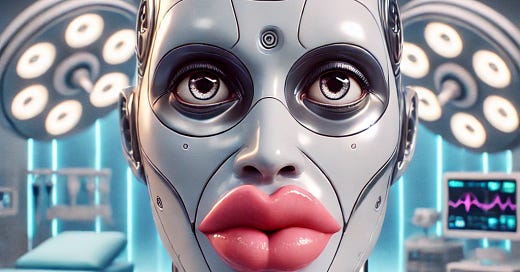Bot Lifts
How to worry about losing the things that “make us human” while sporting $100,000 worth of elaborate plastic surgery.
“I’m really worried about what Artificial Intelligence is going to do to the culture,” a woman I know told me recently at a party. “I’m concerned that AI is going to make us lose the things that make us human.”
I nodded in sympathetic agreement, which I what I do when I vehemently disagree. I’m not trying to be mean here, but the woman who was so concerned about losing the things that “make us human” is probably sporting about $100,000 worth of elaborate plastic surgery.
Her lips, the skin around her eyes, the weirdly tight skin around her jaw, and probably a lot of other places I couldn’t see were long ago replaced by artificial plastics and fillers. And she’s not alone. About $68 billion was spent on cosmetic surgery in the United States in 2020. That’s an awful lot of enhancements, augmentations, lifts, tucks, and pull-ups. And if we’re being honest with ourselves, the results don’t make anyone look more lifelike. In the best case, a person looks mildly amphibious. In the worst case, they look like Madonna. In other words, not quite human. A lot of people, I’ve discovered, who are worried about Artificial Intelligence are already pretty artificial.
And it doesn’t stop with appearance. Huge strides have been made in the treatment of some very real psychological disorders. For people who suffer from depression, anxiety, and other mental health issues, some of the breakthroughs in effective treatments have been nothing short of miraculous. Yes, there is a “but” coming.
But it sometimes seems to me that everyone I know is taking a mood-altering drugs. Maybe it’s because I have been working in Hollywood for thirty years, or maybe I just move in anxious circles, but the number of people I know who are medicated for the mildest human discomforts is truly surprising.
“How do you deal with jet-lag?” A friend asked me recently. I told him that I set my watch to the destination time as soon as I board the plane, try to sleep as much as possible on the way, and then power through the day at my destination until an appropriate bedtime. “That gets me on track in a day or so,” I told him.
He looked confused. “I meant, do you use Adderall or Provigil?”
It turns out that my friend deals with his jet-lag this way: he gets on the plane, has a couple of glasses of wine, takes an Ambien to sleep, and then when he lands he takes about 10mg of something traditionally prescribed to treat ADHD to get him through the day. (It actually sounds like it works, to be honest.)
He takes all of those ADHD medications and sleep aids anyway, on a regular basis. “The Ambien is great for sleep, though I also use Xanax if I need it. And the ADHD meds help me concentrate,” he said. “They keep me productive and in top form.” Which may be true, but he’s always struck me as a little jittery and over-caffeinated. And now I know why.
It’s unkind of me to mention that my friend also has porcelain veneers on his front teeth (for cosmetic reasons) and an artificial knee (for actual reasons) and has recently, somehow, reversed a serious case of male pattern baldness. It’s unkind to mention, but mention it I did.
Maybe I’m overthinking things — a problem for which I could be prescribed Zoloft or Lexapro — but it seems to me that while computers are racing ahead, trying to simulate lifelike human activity, people are moving even more quickly in the opposite direction. The sags and paunches and discolorations of the human body are being spruced up and replaced. The messy variations of the human mood — sleepiness, anxiety, sadness, distraction — are being evened out by psychopharmacology. The human mind and body are becoming more artificial just as computers are becoming more human.
“How do you feel about Artificial Intelligence?” I asked my friend. And he told me — no surprise — that he’s worried AI will change humanity for the worse. Soon, he said, we won’t be able to tell the difference between an artificial machine and a real, live human being.
What could I do but nod in sympathetic agreement?



Another hilarious one for my weekend thank you Rob
These people are going to be very pissed off when they eventually get that fatal, unfixable diagnosis
Great piece as always